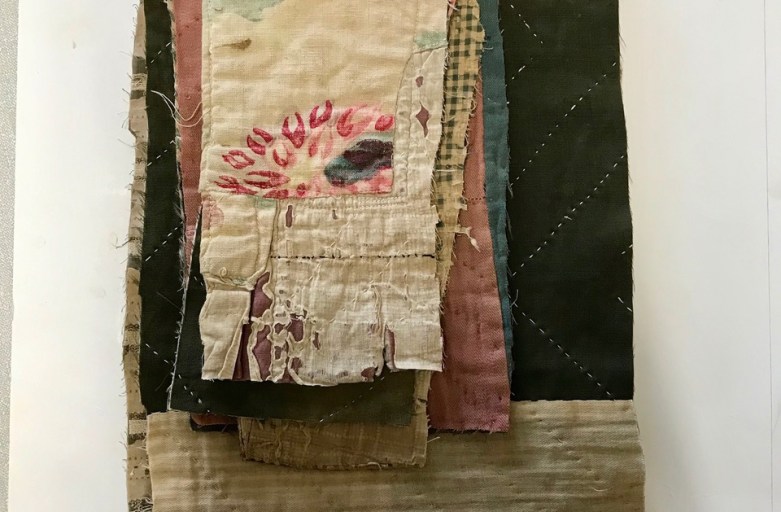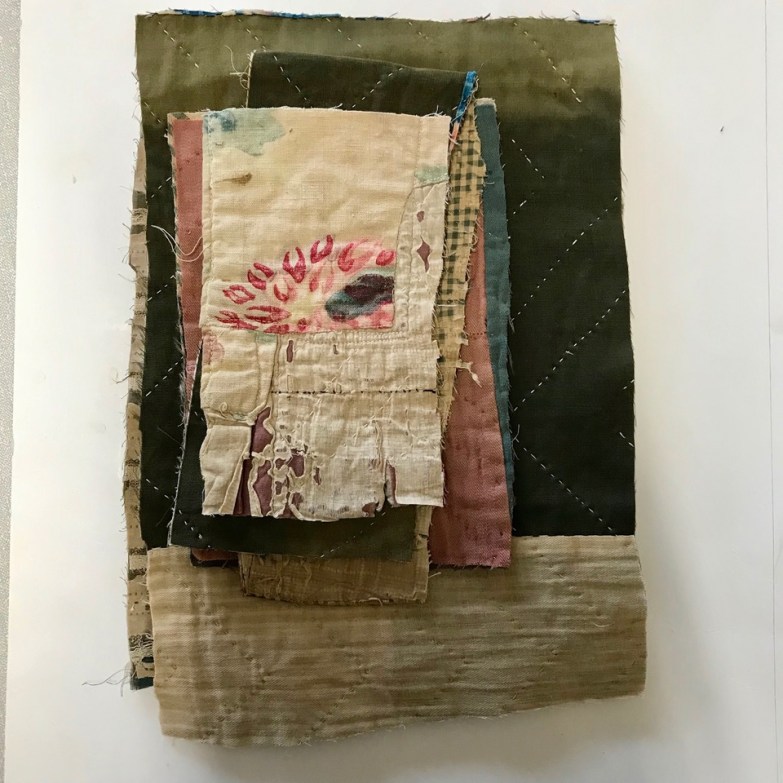The Textile Study Group offer a biannual award of £1500 for a Star Project. Emma McGinn shares her experiences in this 3rd and final blog- of her award winning Star Project.
I’m pleased to share that the Patchworking Motherhood project came to a successful close just before Christmas. Five of the six participants were able to complete their patchworks within the project timeframe. One participant, who experienced a few barriers to attending the weekly sessions, has chosen to take her patchwork home to carry on in her own time.

The final few weeks saw a slight change in atmosphere and pace as the focus turned towards completing individual projects within the timeframe. So as not to pressure the participants, they were each given the option to aim for a patchwork blanket/play mat or a wall hanging. The wall hanging being the less prescriptive option. The group were shown examples of each, along with various options for hanging and displaying textiles.

Each participant was keen to make a quilt, so plans were made to map out everyone’s steps to completion. The room during these final weeks felt electric and full of energy, in contrast to the calm and introspective early weeks. We finally made use of the sewing machine, using it to hem quilt edges. In true form the machine caused more trouble than it was worth, jamming and knotting up just as I was thinking it would save us time. But we got there in the end, with five wonderfully unique and personal patchwork blankets.
During the final couple of weeks conversation in the group started looking towards what might come next. A few participants have been exploring opportunities to continue engaging with craft activities through courses and other groups. Two participants have started their own personal craft projects since the course has ended.

At the beginning of the course Fiona set up a private WhatsApp group (Fiona and I were members of this group during the course, but have since removed ourselves), this has given the participants an opportunity to keep in touch beyond the course, they have been keen to see the group remain open and are currently planning a first meet-up.
We are grateful to all the participants and support staff for their enthusiasm as they all contributed to making the project a great success.

Final reflections..
Last month, Fiona and I met to share our final reflections on the project. Thanks to the Textile Study Group funding, we were able to design and deliver an eight-week course of two hours per week, with six participants and their babies (although not every participant was able to make it each week).
During the planning and budgeting phase, Fiona and I had considered numerous options, including running the group for longer with less childcare support, considering different session lengths, timings and locations.

We made the right decision to hold the group in a private room in a library. The space was clean, airy, bright, easily accessible and private. Although the cost of the room was more than we had budgeted, savings elsewhere allowed us to accept this cost.
Our biggest saving was in materials, we spent less on fabrics than expected thanks to sourcing fabrics from the scrap store and donations, plus with the smaller group size we saved on the cost of wadding. I’ve included a summary of the spending for your review in a separate excel document.
I was very fortunate to partner with Fiona with the support of Dorset Perinatal Mental Health department, this project would not have been possible without her commitment and energy. The salaries for myself plus two carers accounted for most of the project budget. It was the salary costs translated into hours that ultimately dictated how many hours we could run the project for. But we agreed that it was the right decision to bring in paid care workers as opposed to volunteer helpers for example as this offered peace of mind for us all.

Our initial proposal had accounted for a participant group of up to ten people with babies. In retrospect, this would have been extremely ambitious. Even with the participant numbers as they were, all staff including myself and Fiona were required to help with babies most weeks. This meant that there were only a few occasions where Fiona and I were able to stitch alongside the group. At times this limited my ability to move around the room to offer sewing support, but it also broke down barriers as there was a sense that we were all in it together. The babies seemed to enjoy moving around the room, watching the colourful fabrics and engaging with the people in the room.
It would have been nice to have more carers, to run the sessions for longer (three hours rather than 2), and to stretch the course over ten or even twelve weeks. But any of these would have increased the costs beyond what we had available.

Overall Fiona and I are extremely happy and proud of what we achieved. To be able to offer the course free of charge to participants (with free childcare) felt extremely important and special. The feedback from participants says it all:
‘The Patchworking group has been such a wonderful break from the challenges of everyday parenting. The facilitators are wonderful kind, compassionate, and supportive women, creating a warm and welcoming environment where it feels safe to ask for help. I started attending when my daughter was just a few months old, and it felt like the perfect place to take a little time for myself whilst knowing she was being cared for nearby. I don’t think I would have ever allowed myself the time to create something at home, so I’m incredibly grateful for the chance to be part of such a special and nurturing group.’ Patchworking Motherhood Participant
‘It is great that there are such caring ladies on hand to help look after babies as it really means we can all have some much-needed calm, quiet and focused time on what, for me, has become a new hobby! Each week, I am feeling an ever-increasing sense of accomplishment which certainly helps to facilitate good mental health and I’m excited to see my final patchwork creation! The homemade cake and tea (which we get to drink before it gets cold) is also a welcome bonus. I wish every parent got this weekly moment of tranquility that ‘Patchworking Motherhood’ brings!’ Patchworking Motherhood Participant
‘The overall atmosphere was very warm and inviting. Even if you don’t feel ready to partake in conversations there is no feeling of awkwardness as you can just lose yourself in your sewing. All whilst knowing that your little one is being well taken care of near you so you can feel like yourself again with a hot drink and delicious treats.’ Patchworking Motherhood Participant
We had considered ways that we might gather weekly responses from the group as a way to document the sessions. We didn’t want it to be too laborious and so came up with the idea of a patchwork of words. Each week participants were invited to add a word to the patchwork. Here is the final patchwork:

Fiona has turned this into a word cloud which is lovely:

Next steps
Fiona and I have been discussing ways that we might continue this work by exploring funding options and alternative support. We will be putting together a proposal in the coming weeks with the aim to apply for funding to set up and run three similar Patchworking Motherhood courses across Dorset.
I am also considering developing a paid version of the course, open to all mothers/parents in the community. This would look slightly different to the Patchworking Motherhood course we have developed. I am in the process of scoping out how it might work so watch this space.
Engaging in this project has been extremely rewarding for myself and Fiona. Its been an honour for me to work with Fiona and the participants, who made the group a success with their positive and open minded approach. Being part of a community who meets weekly to stitch has reminded me that there is so much power in making together. I have also been able to use this time to immerse myself in the topic of patchworking, helping me to reflect on my practice-based PhD.



















